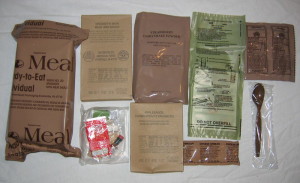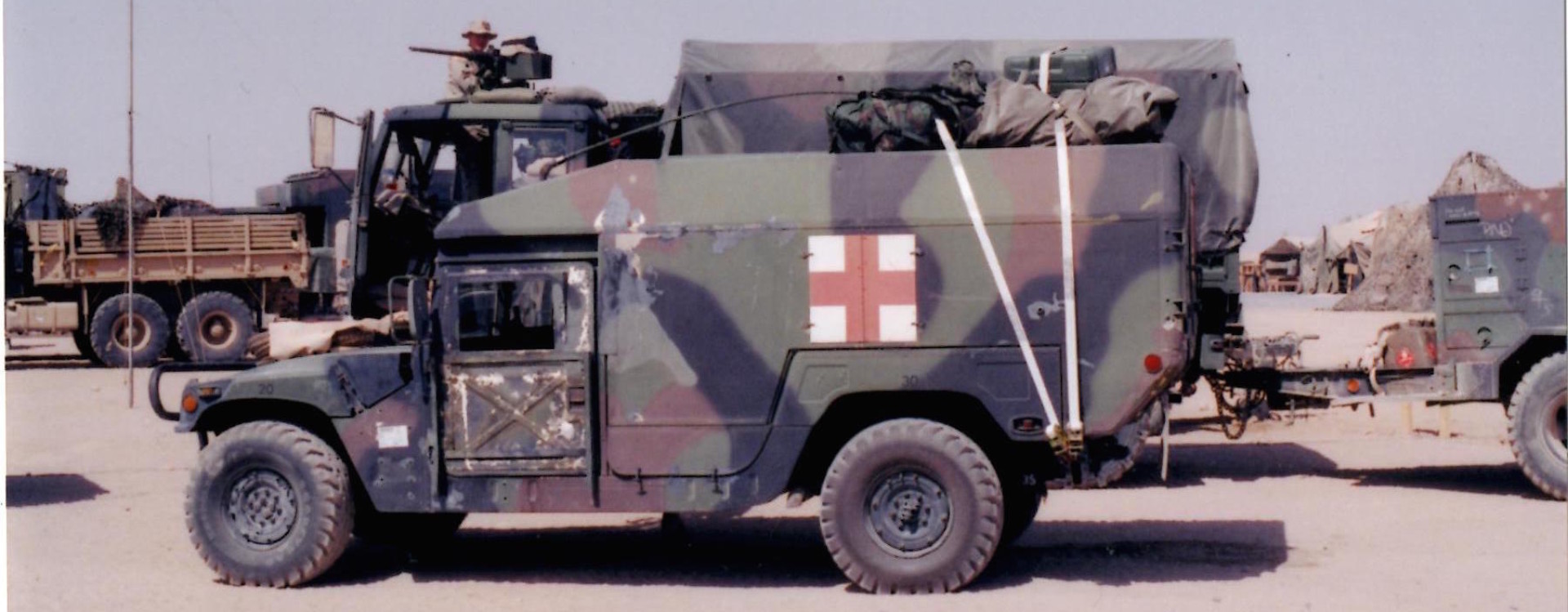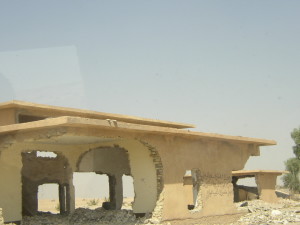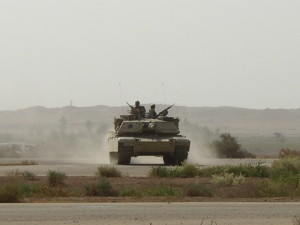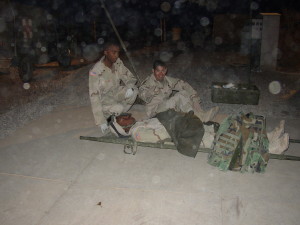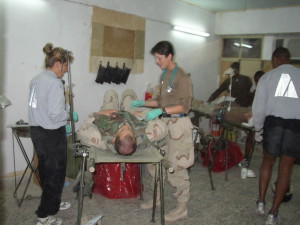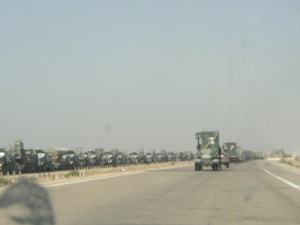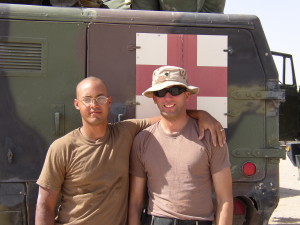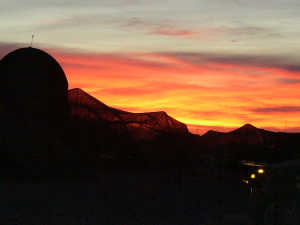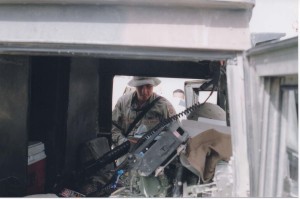
Dustan checking the cab of our ambulance.
I jerk forward, ducking my head, arching my shoulders and drawing my knees towards my chest, as though trying to dodge something. I am momentarily speechless, because it feels like my balls have jumped up into my throat. I look at Dustan in the driver’s seat and the look on his face tells me that he knows exactly how I feel.
The shockwave had gone through our vehicle, through us, so quickly that it was a memory before it even had time to be a thought. The radio erupted with chatter, voices asking us if we were alright, if everything was ok. As our insides unwound, we understood that we were uninjured. Improbably, the roadside bomb that had exploded next to our ambulance injured no one, damaged not one vehicle. From our side view mirrors, we saw the cloud of dust and smoke from where it detonated and further afield, in the desert sand across the highway, we saw smaller wisps of smoke from what must have been shrapnel. There was no point in investigating to be sure, but it appeared that the bomb that was meant for us had been some kind of claymore, designed to blast shrapnel in the direction of one’s enemies upon detonation. This particular claymore had been set backwards. We lucky bastards.
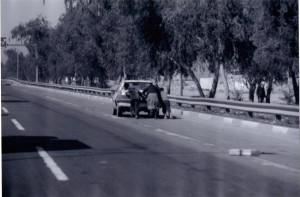
Roadside view.
Moments later, we reached the spot on the highway, where we needed to turn off onto a desert track that would carry us back to our base at al-Taqqadum, or TQ, as we called it. In order to get off the highway and onto the track, the convoy needed to make a left turn across the entire breadth of the highway, which involved stopping oncoming traffic while we made the turn. A scout vehicle with a mounted 0.50 caliber machine gun placed itself in front of oncoming traffic to act as a roadblock while the other vehicles in the convoy passed on its other side. Traffic was light, consisting of a few cars and an oncoming 18-wheeler, whose cargo section was a long cylindrical fuel tank. By the time we realized that the 18-wheeler wasn’t going to slow down, it was too late to have deterred it even with the 0.50 cal. Those vehicles that hadn’t crossed the highway yet pulled forward to get out of the truck’s path. The scout humvee that had acted as a roadblock jerked off to the side. The 18-wheeler veered sharply away from the scouts and slammed into the aluminum divider in the shallow ditch that served as a median, sending bits of aluminum flying through the air like matchsticks that had been struck with a sledgehammer. The slope on the other side of the ditch helped to push the cab of the truck to an angle just shy of perpendicular to our side of the highway, but its momentum kept it going forward into our line of vehicles. As the cab of the truck came surging out of the ditch and onto the road, its long cylindrical fuel tank tipped violently and slammed forcefully into the ground, half in the ditch and half on the pavement, pulling the cab over with it. The truck barely slowed, despite now being on its side, as it continued towards our line of vehicles.
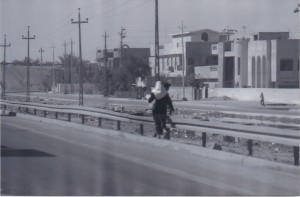
Woman on the roadside.
The entire convoy was in a state of panic. When the 18-wheeler first went into the ditch, the driver of the forward vehicle made the quick decision to throw his or her truck into reverse and everyone behind them started doing the same, only a second behind, leading to a collapsing accordion motion going back through the convoy like a shockwave. In only the few seconds it took to see that the 18-wheeler’s trajectory had changed and we now had to drive forward and off to the side to avoid it, Dustan & I were jammed too tightly between our flanking vehicles to move more than a few inches in any direction. The two or three trucks ahead of us were doing their best to move out of the way, but by the time the one directly ahead of us had cleared enough space for us to maneuver, it was too late.
It was a scene ripped straight from an action movie. I clearly recall hearing the convoy commander’s voice over the radio. All he said was “Uh, medics…?” I clearly remember my response, given while staring at several tons of onrushing death. It consisted of one word. “Yup.”
For the second time that afternoon, though, luck favored us. The crashing truck didn’t quite make it as far as our vehicles and came to a rest just a few feet from our ambulance. Fuel gushed from the bowels of its trailer, creating a small lake around the truck. We pulled forward and put some distance between ourselves and the truck, then grabbed our aid bags, got out of the ambulance and walked cautiously towards the monumental crash. As we walked, we began trying to plan how we might access the truck’s driver, when a small boy of maybe 11 or 12 climbed out the driver side window, now facing towards the sky, and clambered to the ground. The boy was followed immediately by a middle-aged man and in the span of a few seconds, the two of them stood in the middle of the pooling fuel, surveying the wreck of their livelihood.
Dustan and I tried to hail them, waving and motioning to ask if they were alright, but they resolutely ignored us. Amazingly, we saw no obvious wounds on them, nor any sign of bodily damage. We stopped walking towards them when the man finally made a motion of resigned disgust with his head and shoulders, sat down and lit up a cigarette.
“Aren’t you going to check them out, medics?” a female sergeant standing nearby asked us.
“Sergeant,” Dustan told her, “I’m not going into that lake of fuel to have a face-to-face with a guy smoking a cigarette.”
I thought that Dustan had made an unassailable point, but the sergeant, one of our battalion’s mechanics, was unimpressed.
“That’s [I forget what she said it was], not gasoline. It won’t ignite unless under pressure. Now go check him out.”
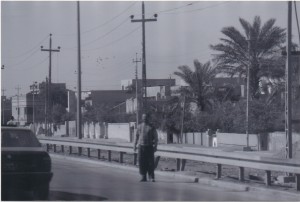
Another hastily-snapped shot of our convoy view.
Despite our lack of subject expertise, we remained unconvinced and managed to stall until a few more people arrived. We soon stood in conference with the convoy commander, a couple more mechanics and some others, all gazing at the smoking man amidst the wreckage. The other mechanics all agreed with their sergeant and although we made sure that our apprehension was heard, we eventually lost the argument and were ordered to go into the fuel pool to assess the driver and the boy.
Ever since we got word of the deployment, I made it a personal goal to learn arabic. Their were no formal classes that I could have taken part in, prior to deployment, so I got hold of language learning books and a translation dictionary. In country, our interpreter was a Mauritanian guy who had worked in IT for the State Department until they asked him to consider a career change. He agreed to give me lessons and by the time of the truck crash, I could effectively do my job as a medic in arabic as well as muscling through a very limited set of other topics.
In an act of diplomacy, Dustan and I persuaded the man to put out his cigarette and, although he would not consent to let us check him for any injuries, he did allow us to evaluate his son. This boy, the son of the truck driver was clearly shaken, but utterly uninjured. His nervous movements and visible agitation stood juxtaposed with his father’s immobility and taciturn sense of resignation. During our assessment, we got the story of the crash from their perspective. The father, it turned out, had allowed his son to drive the truck. Driving a semi is more complicated than driving your everyday passenger vehicle and the kid had lost control, trying to slow down for our roadblock. Their sudden diversion into the median had been a desperate act to avoid a rear-end, high-speed collision with the vehicles that had stopped for our convoy. The boy and his father lived in their truck and made their living from it. They were uncertain how they would recover from this crash. Although unharmed, the boy was quite shaken. His father, defying our previous diplomatic success, lit another cigarette, shifting his gaze of morose despair from the wreck of his cab to the desert horizon.
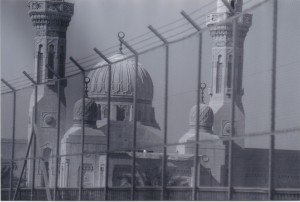
The closest I ever came to a palace.
We still didn’t like standing a pool of fuel with a lit cigarette, no matter how combustible it may or may not have been. As there were no injuries to treat, we decided to leave and report back to the convoy commander. We found him on the other side of the highway, where we had set up the roadblock, talking to another Iraqi man. The roadblock had been reinstated while we had evaluated the father and son and the drivers who found themselves stopped by it were clearly agitated.
“Ray!” the commander called out as we approached. “I’m glad you’re here. Talk to this guy, explain to him that he has to wait for the convoy to pass.”
I engaged in my task without enthusiasm. I didn’t really know why we had maintained the roadblock during the time since the crash happened. It seemed pointless to me and allowing more cars to pile up at that spot only made me feel more vulnerable. Our luck had already been tested twice that day.
In the moment it took the commander to speak to me, the man had turned his attention to the scout standing nearest to us. He argued and pleaded, as much with his hands as with his mouth, while the scout struck his best don’t-mess-with-me pose. As I walked to them, the man put his hands on the scout’s chest. The scout reacted quickly, talking a step back and raising his M-4, barrel towards the man’s chest. It was a motion that we had been trained to make but from an observer’s perspective, it looked ridiculous, an armed and armored man backed up by a bunch of armed and armored men who would all fight like dogs to protect each other, acting threatened by a lone, skinny, unarmed man wearing sandals.
“I got this,” I said, waving the scout away.
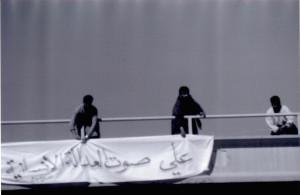
Women hanging a banner.
It didn’t take any special language skills to understand the guy. He was mad at being made to wait for no apparent reason. Why couldn’t he and the other drivers have just been let through earlier, so that they would be out of our way? Good questions, all, and I had no real answer.
“I’m truly sorry,” I said, “just hang out a few more minutes. We’ll drive through and be out of your way. Please return to your car. I’m sorry.”
With little else to say, I just kept apologizing until the man gave up and returned to his car. I then returned to my ambulance. Dustan and I asked the convoy commander if there was anything else that we could do for the semi drivers. Perhaps arrange a payment to help them recover. After all, this war was nominally about winning hearts and minds, as well as battles.
“There’s nothing we can do,” the commander shrugged, “they’re at fault.”
We mounted our vehicles and drove from the highway onto the dirt track that led us home, leaving behind a crowd of delayed travelers, a shaken boy and a man staring at the horizon.
